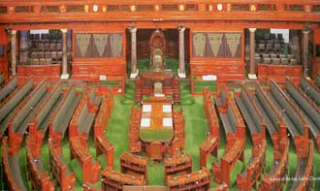Why do we need a parliament?
NCERT - Chapter 3 - Civics
Questions and Answers
Question 1: What is coalition government?
Answer:
① Often times in the recent past it has been difficult for a single political party to get the majority that is required to form the government.
② They then join together with different political parties who are interested in similar concern to form, what is known as a coalition government.
Question 2: What is a question hour?
Answer:
① The parliament, while session, begins with the question hour.
② The question hour is an important mechanism through which the MPs can elicit information about the working of the government.
③ This is a very important ways through which the Parliament controls the executive.
④ By asking questions, the government is alerted to its shortcomings and also it comes to know the opinion of the people through their representatives in the Parliament i.e. the MP
Question 3: Why do you think reservation for Dalits and women is important in Parliament?
Answer:
① It has been observed that representative democracy cannot depict a perfect reflection of society.
② There is a realisation that when interests and experiences separate, then it is important to ensure that communities that have been historically marginalized are given adequate representation.
③ Similarly, it has more recently been suggested that there should be reservation of seats for women.
④ With this in mind, some seats are reserved in the Parliament for SCs and STs. This has been done so that the MPs elected from these constituencies will be familiar with and can represent dalit and adivasi interest in the Parliament.
Question 4: Why do you think the Nationalist movement supported the idea that adults have a right to vote?
Answer:
① India became independent on 15th August, 1947. Preceding this, there was a long and difficult struggle in which many sections of society participated. People from different backgrounds joined the struggle. They were inspired by the ideas of freedom, equality and participation in decision making.
② The experience of the colonial rule as well as the participation of different people in the struggle for freedom left a little doubt in the minds of the nationalists that all persons in independent India would be able to participate in making decisions.
③ It didn't mean that the government could do what it felt like. It meant that the government had to be sensitive to people's needs and demands.
④ The dreams and aspirations of the freedom struggle work concrete in the constitution india that laid down the principle of Universal adult franchise that is that all adult citizen s of the country have the right to vote.
Question 5: What is a parliament and how does the executive control of the government?
Answer:
① The parliament in India consists of the president the Rajya Sabha and the Lok Sabha.
② The executive is a group of persons who work together to implement the laws made by the parliament.
③ The parliament session begins with the question hour. The question is an important mechanism through which MPs executives can elicit information about the working of the government
④ by asking questions the Government is alerted to the shortcomings and also comes to know the opinion of the people.
⑤ Executive from the opposition party highlight the drawbacks in various policies and programmes of the government. in this way they play a critical role in healthy functioning of democracy.
Question 6. Why do you think There are few women in Parliament? Give two reasons.
Answer:
1. Absence of any system for proper representation of women in the parliament such as reservation of seats for women
2. Discrimination against women in a male dominated society.
Question 7: You have read that most elected members whether for the panchayat or the Vidhan Sabha or the Parliament are elected for a fixed period of 5 years. Why do we have system where the representatives are elected for a fixed period and not for a lifetime?
Answer:
Members are elected for a fixed period so that people can use their preferences again after 5 years to elect their representatives.
This is required for efficient working of the democratic system. Moreover in democracy people have right to express their choices and elect their leaders which will not be possible unless they are for a fixed time.
 |
| Lok Sabha |
Question 8: Differentiate between the two houses of the Parliament
Answer:
| No. | Lok Sabha | Rajya Sabha |
|---|---|---|
| 1. | It is called the house of the people and is directly elected by the people. | It is called the Council of States and is indirectly elected by the elected representatives of the legislative assemblies of various States. |
| 2. | Total members are 545, of which 543 are elected and two are nominated by the president. | Total members are 245 of which 233 are from state legislature and remaining 12 are from different fields. |
| 3. | Lok Sabha is presided over by the speaker. | Rajya Sabha is chaired by the vice president of India. |
| 4. | It has more power over financial matters. | It has no such power. |
| 5. | Members are elected for a period of 5 years . It is a temporary house and it dissolves after 5 years. | It is a permanent house. Two third members retire after every two years. So every member have a tenure of 6 years. |

superb
ReplyDeletevery helpful
ReplyDeleteEasy understanding
ReplyDeletegood
ReplyDeletefine
ReplyDelete